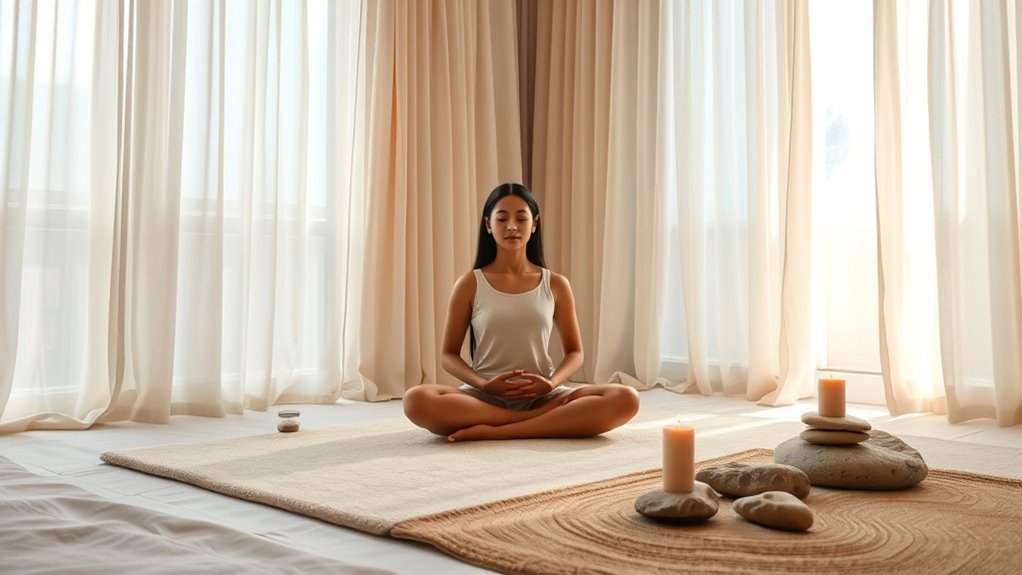To improve sleep using mindfulness and meditation, start with simple breathing exercises—inhale deeply through your nose, hold briefly, then exhale slowly. Practice a body scan, consciously relaxing each part from your toes to your head, to quiet racing thoughts and release tension. Dedicate five to ten minutes before bed daily, creating a calming routine. With consistency, these techniques become natural, helping you fall asleep faster and enjoy more restorative rest—if you pay attention to each step, you’ll discover even more ways to enhance your sleep.
Key Takeaways
- Practice deep breathing exercises, inhaling through the nose and exhaling gently to promote relaxation before bed.
- Use a body scan technique to systematically release tension from toes to head, grounding awareness in physical sensations.
- Dedicate 5-10 minutes nightly to mindfulness or meditation to establish a calming pre-sleep routine.
- Focus on calming the nervous system by reducing stress and quieting racing thoughts through meditation practices.
- Develop a consistent bedtime ritual that fosters relaxation, making it easier to transition into restful sleep naturally.

Mindfulness and meditation techniques have become popular tools for reducing stress and improving mental clarity. If you’re struggling to fall asleep or stay asleep, incorporating these practices into your nightly routine can make a significant difference. One effective method involves focusing on breathing exercises. By paying close attention to your breath, you help calm your nervous system and signal to your body that it’s time to relax. Start by taking slow, deep breaths, inhaling through your nose for a count of four, holding for a moment, then exhaling gently through your mouth for a similar count. Repeat this process several times, allowing your breathing to become more natural and effortless. This simple exercise helps quiet racing thoughts and reduces physiological tension, making it easier to drift into sleep. Proper breathing techniques can also help regulate RMDs by promoting relaxation and reducing stress on your body.
Another powerful technique is the body scan, which encourages you to systematically bring awareness to different parts of your body. As you lie in bed or settle into a comfortable position, begin by directing your attention to your toes. Notice any sensations—warmth, tingling, or tension—and breathe into those areas. Slowly move your focus upward through your legs, abdomen, chest, arms, neck, and face. With each segment, consciously release any tension you notice, inviting relaxation. The body scan helps interrupt the cycle of anxious or racing thoughts by grounding your awareness in physical sensations, creating a feeling of calm that promotes sleep. It’s especially helpful if your mind tends to race with worries or thoughts about the day.
Integrating these techniques into your nightly routine can be straightforward. Dedicate five to ten minutes before bed to practice breathing exercises and the body scan. Over time, you’ll likely find that these practices become more natural and effective at easing your shift into restful sleep. The key is consistency; practicing regularly reinforces the calming signals to your nervous system, making it easier to unwind after a busy day. Remember, the goal isn’t to force yourself into sleep but to cultivate a state of relaxation that naturally leads to rest. With patience and practice, breathing exercises and body scans can transform your bedtime into a peaceful, restorative experience, helping you wake up feeling refreshed and energized.

Mixcous King Adjustable Bed Base Frame - Premium Metal, Head & Foot Incline, Wireless Remote, Zero Gravity, Quiet Motor (79" L x 74" W x 12.72" H) Black
NOTICE: Delivered in 2 separate boxes that may arrive at different times—please wait for all packages to arrive...
As an affiliate, we earn on qualifying purchases.
Frequently Asked Questions
Can Mindfulness Help With Chronic Insomnia?
Yes, mindfulness can help with chronic insomnia. By practicing relaxation techniques, you reduce stress and calm your mind before bed. Incorporate mindfulness into your sleep hygiene routine, such as deep breathing or focused meditation, to ease racing thoughts. Consistently applying these practices helps create a peaceful pre-sleep environment, making it easier to fall asleep and stay asleep. Over time, mindfulness can markedly improve your sleep quality.
Are Meditation Apps Effective for Sleep Improvement?
Yes, meditation apps can be effective for sleep improvement when combined with good sleep hygiene and relaxation techniques. You can use these apps to guide you through calming exercises that ease your mind before bed. They help reduce stress and create a relaxing bedtime routine, making it easier for you to fall asleep and stay asleep. Just make sure to choose apps that focus on mindfulness and relaxation for the best results.
How Long Does It Take to See Sleep Benefits?
You might notice changes in your sleep duration and quality within just a few days, but for lasting benefits, give it a few weeks. While some see quick improvements, consistent practice helps deepen relaxation, leading to better sleep over time. Don’t expect overnight miracles—steadily incorporating mindfulness and meditation can gradually enhance your sleep, making restful nights more frequent and waking mornings more refreshed.
Can Meditation Replace Medication for Sleep Issues?
You can’t fully replace medication with meditation, but it can considerably improve your sleep over time. Regular meditation, even just 10-15 minutes daily, helps you develop effective breathing techniques that calm your mind and body. While meditation may not eliminate all sleep issues, it’s a natural, side-effect-free way to reduce stress and promote relaxation, making it a valuable complementary practice alongside or instead of medication.
What Are Common Mistakes Beginners Make in Meditation?
Did you know that 70% of beginners give up on meditation within the first month? One common mistake you might make is neglecting proper posture; sitting too stiff or slouching can hinder relaxation. Also, avoid rushing through breathing techniques—slow, deep breaths help calm your mind. Focus on maintaining comfortable posture adjustments and consistent breathing to build a sustainable meditation practice that improves your sleep over time.

Blissful Nights e4 King Adjustable Bed Frame with Massage, Anti-Snore, Zero Gravity, USB Charging, Under Bed Lights, Wireless Remote Head and Foot Incline
Built for durability with tested electronics and long-lasting lift motors
As an affiliate, we earn on qualifying purchases.
Conclusion
By incorporating mindfulness and meditation into your nightly routine, you can transform your sleep quality from a mere wish to a nightly miracle. These techniques are your secret weapon against restless nights and racing thoughts, helping you relax deeply. Stick with it consistently, and you’ll discover that peaceful, restorative sleep becomes as effortless as breathing—something you might have thought was impossible. Embrace these practices, and watch your sleep transform into the best part of your day!

Magicteam White Noise Machine with 20 Non Looping Natural Soothing Sounds Memory Function 32 Levels of Volume Powered by AC or USB and Sleep Sound Timer Therapy for Baby Kids Adults Black
❤20 Non-Looping Sleep Sounds: White noise ,Brown noise, pink noise, blue noise, fan,brook, rain, ocean,bird and Bonfire,suitable for...
As an affiliate, we earn on qualifying purchases.

Nestl Adjustable Bed Frame, Zero clearance Adjustable Massage Bed Frame with Wireless Remote, Adjustable Bed Base Head & Foot Massage, Fast & Easy Assembly, USB Ports, LED Light, King Size Bed Frame
NESTL ADJUSTABLE BED FRAME: Adjustable elevation to suit your needs, with ergonomic positions for head elevation and foot...
As an affiliate, we earn on qualifying purchases.







